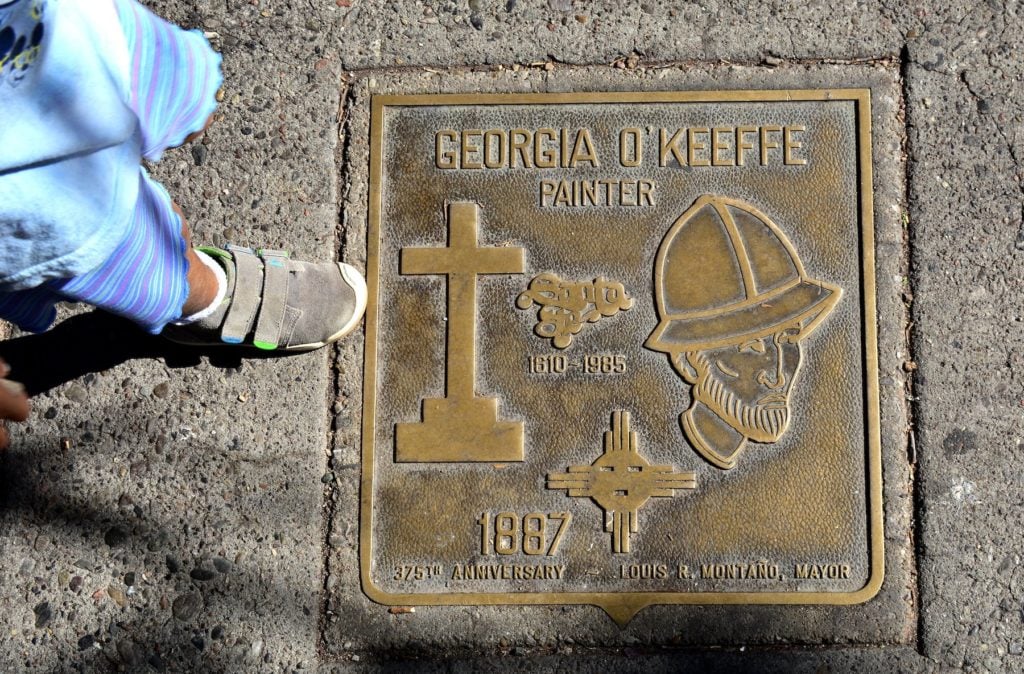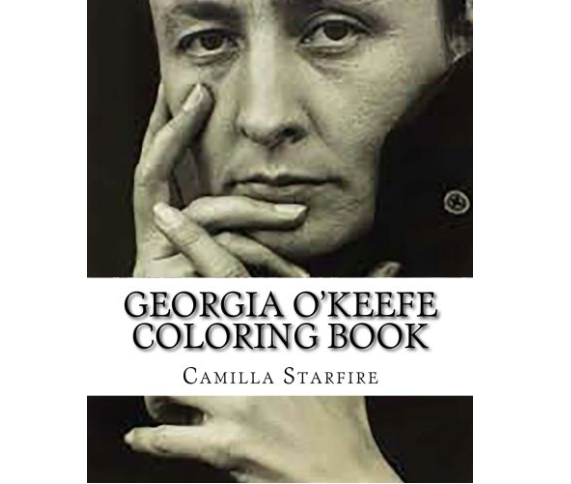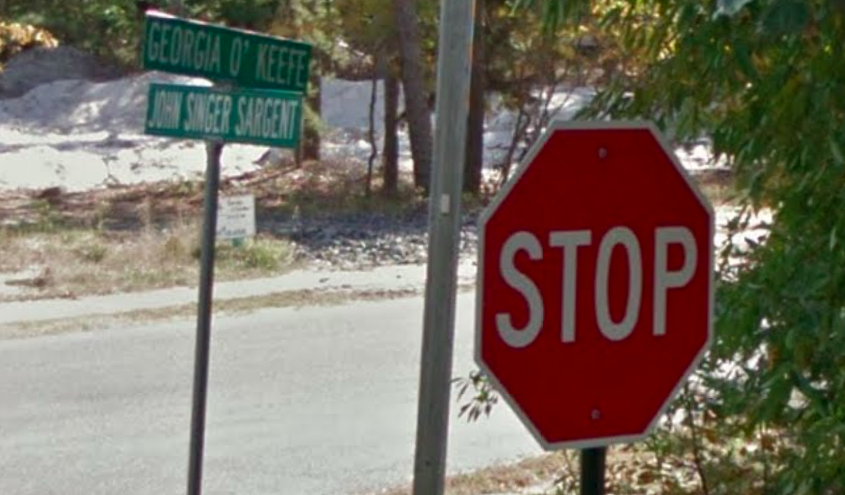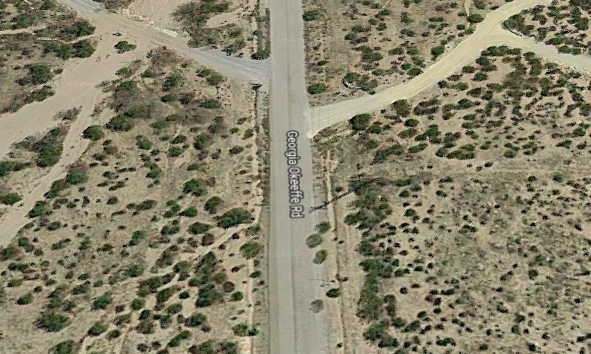Art World
The Spelling of Georgia O’Keeffe’s Name Is Now the Subject of an Internet Conspiracy Theory About Parallel Universes
It's an example of what is called the "Mandela Effect."

It's an example of what is called the "Mandela Effect."

Ben Davis

Quick—what’s the correct spelling, “Georgia O’Keefe” or “Georgia O’Keeffe”? And before you say anything, know this: How you answer may literally depend on which reality you live in.
For the record, the art-historically correct answer is the one with two “F”s. Nevertheless, some people still really, really believe that the famed American painter, pioneer of abstraction, and icon of the Southwest is “Georgia O’Keefe.” And not only that: They believe that the co-existence of the two names is evidence of parallel dimensions, or a sinister conspiracy of mass mind-control. Or something.
The “O’Keefe/O’Keeffe” question has recently bubbled up in internet chatter as a cardinal example of the “Mandela Effect,” a term coined in 2009 by Fiona Broome, an author of several “how-to books about ghost hunting.” After a speaking engagement at the annual sci-fi convention Dragon Con, she realized that several people in her circle had similar memories of South African political leader Nelson Mandela having died in prison. He was, at that time, still very much alive. (He passed away in 2013.)
The “Mandela Effect” became, in Broome’s use, the name for “what happens when someone has a clear memory of something that never happened in this reality,” as her official website dedicated to the phenomenon puts it. Online communities have sprung up around documenting examples where collective memory seems to disagree with recorded fact.

The cover image for the “Georgia O’Keefe Coloring Book,” one of the key pieces of evidence that we live between multiple dimensions.
The most viral example probably concerns the classic children’s picture book series by Stan and Jan Berenstain, the “Berenstain Bears,” which many, many people insist was originally titled the “Berenstein Bears.” Most are similarly firmly in the realm of pop-culture trivia, including the fact that Star Wars villain Darth Vader never actually says the line “Luke, I am your father” and that the actress in the film Frida is “Salma Hayek” and not, as some are convinced, “Selma Hayek.” (“Paul Gauguin” vs. “Paul Gaugin” and “Edvard Munch” vs. the Anglicized “Edward Munch” are also in the Mandela Effect mix.)
Where this all crosses over from the realm of funny trivia to spookier territory (or sillier territory, depending on your perspective) is the insistence that these false memories are examples of sinister paranormal disturbances. “Some of us speculate that parallel realities exist, and—until now—we’ve been ‘sliding’ between them without realizing it,” the Mandela Effect site explains.
That’s where the painter of Cow’s Skull: Red, White, and Blue comes into the picture, according to Flickr’s “Mandela Effect Database”:
Well this one is sort of mindblowing. If you’ve ever taken an art class, it’s almost a cliche that you’d be introduced to Georgia O’Keefe, and invariably walked through the “flowers? vaginas!” thought exercise. Very few artists achieve household name status, but O’Keefe is an American darling, hailed as the “Mother of American modernism”, and even has a whole museum dedicated to her work.
So when did she become O’KEEFFE, with the two extra Fs at the end? Like I said, mind blown.
History recalls O’Keefe however!
In the jargon, the evidence of alternate spellings is a “residual,” proof of an alternate reality that was not completely erased. In a video posted at the end of August, one YouTube commentator tracks down a host of residual “Georgia O’Keefes” on the web to make the case. “I’m not looking for conflict or trolls or anything else, but I think this Georgia O’Keefe is a pretty solid proof that something spooky and at a distance is going on,” he claims. “I think I could prove in a court of law that her name has been changed.”
The video continues to ask the obvious questions:
Why was Georgia O’Keeffe targeted? I do not think these targets are random, people. Especially on these celebrities. Almost everybody involves wealth. Money seems to be the common denominator. I’ve said this before, but with this Mandela Effect, I do not think the primary motivator is money by any means, but I think that this is a side project, a side application of this technology. So I do think following the money is a wise idea when you are looking into this as well.
Well, that clears things up!
Among the smoking gun pieces of evidence presented is the existence of a “Georgia O’Keefe Road” in Los Cruces, New Mexico, and a “Georgia O’Keefe Way” in Marlton, New Jersey. As to the latter, I am delighted to find that there is a New Jersey neighborhood where all the streets are named after American painters, including “Andy Warhol Way,” “Norman Rockwell Way,” and “Thomas Eakins Way.” And in fact, the township’s “Georgia O’Keefe Way” does seem to be spelled, embarrassingly, with just one “F”.

Street sign for “Georgia O’Keefe Way.” Screenshot from Google Street View.
As for the New Mexico example, “Georgia O’Keeffe Road” now appears with the familiar spelling in Google Maps. Our inter-dimensional overlords are getting pretty sloppy, erasing one part of the digital trail but leaving the other one for all to see.

“Georgia O’Keeffe Road” in Las Cruces. Screenshot from Google Maps.
It’s in the nature of conspiracy theories that every effort at debunking them can be taken as further proof. But there is, of course, a much simpler explanation for the “Mandela Effect” than a rift in the fabric of reality itself. Memory is actually very malleable. Most “Mandela Effect” examples involve a very common mispronunciation or misspelling.
“Berenstein” happens to be a much more common last name than “Berenstain,” so it’s quite logical that a number of people might systematically mistake the one for the other. Similarly, both “O’Keeffe” and “O’Keefe” are common Irish names, and plenty of people in our actual reality have the latter (including far-right media prankster James O’Keefe, who’s been much present in the world of paranoid news these last few years).
Is it worth mentioning that misspellings of her name were something that Georgia O’Keeffe dealt with quite a bit in her own lifetime? According to biography Full Bloom: The Art and Life of Georgia O’Keeffe, the artist expressed frustration that the press consistently got her name wrong in a 1924 letter to author Sherwood Anderson. As author Hunter Drohojowska-Philp explains, “The majority of reviews of her 1923 shows… had spelled her name O’Keefe.”
This all seems amusingly outlandish. There are probably better things to do than to dwell on it. Then again, you shouldn’t really have to debate the idea that the world is flat in 2019, but that, seemingly, is a force to be reckoned with as well.